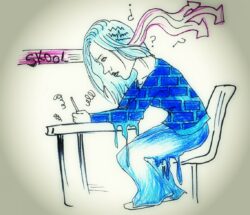“Mental health” — what does that even mean? Although most commonly used in conjunction with the word “issue,” the reality is that everyone sits somewhere on the mental health continuum, just like the physical health continuum. Where you are on this continuum can vary, even day-to-day. It is important to get educated about ways to manage your stress, but also know that mental health issues are very real in the college population. You never know; your roommate, friend or lab partner could be struggling through something. Remember to check in with those around you and say something if you’re ever concerned.
Sadness vs. Depression
Although depression and sadness can look and feel similar, they are actually very different. Sadness is usually triggered by an identifiable event or circumstance — death, a break up, loss of a job or  a disappointment. It is usually shorter lived and may impair one’s life for a short time. There may be intense bouts of crying, some distractedness, low energy or a diminished sense of purpose, however the sad person can usually still function in his or her life.
a disappointment. It is usually shorter lived and may impair one’s life for a short time. There may be intense bouts of crying, some distractedness, low energy or a diminished sense of purpose, however the sad person can usually still function in his or her life.
Depression can be triggered by similar events but can also arise for no apparent reason. Overall, depression has a farther-reaching impact on a person’s daily life and often lasts longer than sadness. Depression usually impacts a person’s mental alertness, emotional state, behavior and level of physical activity. The physiological impact of depression (feeling lethargic, loss of appetite, disturbed sleep, and feeling like lead) is a result of neural changes in brain chemistry. The brain’s ability to utilize serotonin, norepinephrine and dopamine becomes compromised depending on each individual’s unique brain chemistry. People who are depressed feel more than sad. They may feel dull, flat, clouded, down in the dumps or “blue.” When someone is depressed, they have more difficulty concentrating, less interest in being with others and may even stop enjoying their favorite activities in general. There is also a profound difference in how depressed people view themselves. They may feel guilty, worthless or hopeless, have low self esteem, be disgusted with themselves and, in extreme cases, have suicidal thoughts. There are also physical impacts such as difficulty sleeping, low energy and changes in appetite that may lead to fluctuations in weight. Finally, depression, as opposed to sadness, typically lasts two weeks or more.
Early intervention keeps depression from getting worse and can contribute to a quicker recovery. If you suspect that you or a friend feels more than just sad, one of the best things you can do is seek professional help as soon as possible. Make sure to act before the situation becomes dangerous.
“#YOLO” “College will be the BEST four years of your life!” … whoa, whoa, what? Paying rent and bills, living off of ramen noodles and freaking out about your future is the best that it gets? College is a time for a lot of exciting opportunities. At the same time, it can bring loads of stress and feelings that you’ve never experienced before. As you are pressured to black out on the weekends after tough weeks because “it’s what Isla Vistans do,” remember that college is a time to build the basis for the rest of your life. Just because it’s the one time in your life when acting a fool is “socially acceptable,” it doesn’t mean you have to partake in all of the Isla Vista shenanigans. Take care of yourself as you navigate through college — you are, after all, destined for greatness. In the words of The Lonely Island, “Be Care-folo!”
Gladys Koscak, M.S,. is a Mental Health Specialist at Counseling and Psychological Services (CAPS).
As a result of the passing of proposition 63, California Mental Health Services Authority, (CalMHSA) has provided grant funding across California for suicide prevention for K-12 and higher education. The UC Regents have obtained funding for all UC campuses. The UCSB suicide prevention campaign #saysomething is dedicated to educating faculty, staff and students on suicide prevention through mental health education and bystander training. For information on how to request a training contact CAPS grant psychologist Janet Osimo, Psy.D. or grant mental health specialist Gladys Koscak, M.A. at email coun.prevention@sa.ucsb.edu or by calling 805-893-4411.
RESOURCES
Counseling & Psychological Services (CAPS)
Location: pink building across from Storke Tower
http://counseling.sa.ucsb.edu/
* 805-893-4411, a 24/7 number!
Student Health Services (SHS)
Location: across from Thunderdome/Events Center
http://studenthealth.sa.ucsb.edu/ * 805-893-3371
Medical appointments but ALSO…Social Work Services & Psychiatry
Alcohol & Drug Program (ADP)
Location: Embarcadero Hall (2nd Floor) & Student Health Services
http://alcohol.sa.ucsb.edu/
* 805-893-5013
Alcohol and drug education, substance abuse counseling, support groups
Women’s Center/Campus Advocacy Resources & Education (CARE)
Location: Student Resource Building (1st floor)
http://wgse.sa.ucsb.edu/CARE/
* 805-893-3778
Support & advocacy for sexual assault and violence















